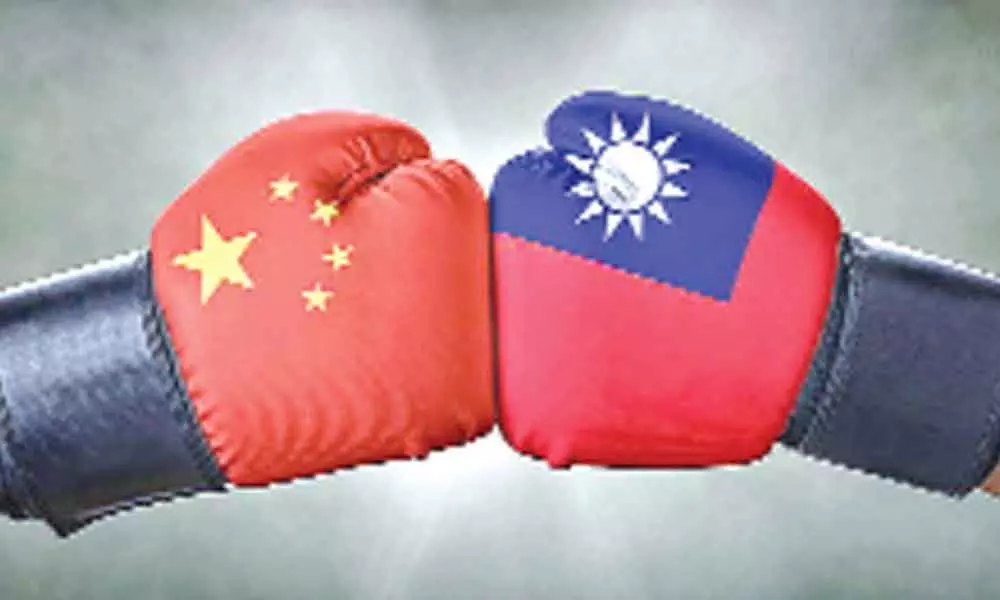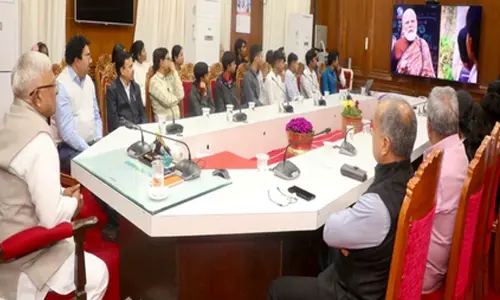China-Taiwan conflict: Invasion, independence or status quo?

China-Taiwan
The shadow of war is once again looming over Taiwan. The provocation of the Chinese is a common phenomenon every October, on the eve of China’s Liberation Day.
The shadow of war is once again looming over Taiwan. The provocation of the Chinese is a common phenomenon every October, on the eve of China's Liberation Day. This time around, it is a record-breaking one-hundred-fifty People's Liberation Army's Air Force personnel infiltrating Taiwan's Air Defence Identification Zone. While Taiwan's Defence Minister, Chiu Kuo-cheng, described it as the toughest challenge posed by China over the past forty years, China's spokesperson for Taiwan Affairs, Ma Xioguang, defended the ominous events, terming them a necessary step.
President Xi Jinping, in his speech, reiterated the call for Taiwan's reunification with the mainland. He also said that China would not hesitate to use force if they consider it inevitable. In a swift response, his counterpart, Tsai Ing-wen, said that Taiwan will not buckle under Beijing's pressure and will defend its sovereignty. Furthermore, Joe Biden has announced that the US is committed to defending Taiwan in a Chinese invasion. With this dialogue war among the leaders, the China-Taiwan issue has again come to the fore internationally. Will China invade Taiwan? Would Taiwan take steps towards complete independence? In the interest of all concerned, would it be better to maintain the status quo?
Historicity of the issue
The history of Taiwan's occupation is long and complex. The first known inhabitants of Taiwan were Austronesian tribes who are thought to have come from southern China. It remained a free island until 1624, then colonised, first by the Dutch, and followed by the Spanish in 1642. The Ming Dynasty annexed it in 1662, ending the Spanish occupation of the island. Subsequently the dynasty's defeat in the Sino-Japanese War of 1894-95, the island was ceded to Japan.
After World War-II, Taiwan became part of the Republic of China (ROC) in 1948, ruled by the nationalist Kuomintang Party. The leader of the nationalist government, Chang Kai-shek, fled to Taiwan with more than a million people in the wake of the victory of the communist revolution in 1949 to form the ROC government in Taiwan. When Chairman Mao Zedong was preparing to invade Taiwan, the war broke out in the Korean peninsula. The Korean war kept Mao engaged for three years, protecting the communists of North Korea and thus the annexation of Taiwan was not realised.
Owing to its geostrategic location, Taiwan emerged as an important ally of the US. The US extended its support to the island country's security during the cold-war period. In the post-cold war era, Taiwan occupied a vital position in the US policy of curtailing China in the Indo-Pacific region. For the Communist Party of China (CPC), Taiwan has become an unfinished chapter in its revolution and remained as the 'renegade'. For the CPC, the annexation of Taiwan would mean completing the task of the communist revolution. Thus, since 1949, each successive President of China has pledged to merge Taiwan with the mainland. No doubt, President Xi Jinping aims to accomplish this pending revolutionary mission.
Later developments
Taiwan-China relations began to improve in the 1980s, three decades after its separation. China proposed the 'one country-two systems' arrangement—offered to Hong Kong—to provide autonomy to Taiwan if it agreed to reunification. Taiwan rejected the proposal, but it relaxed travel regulations and investment and trade. Even though no formal government-to-government talks were held due to China's stubborn insistence on the 'One China Policy', informal consultations continued between the countries. As a result, investment and trade relations between the two countries have grown significantly, and China emerged as Taiwan's largest trade partner.
However, relations between the two countries once again became strained when the Democratic Progressive Party's (PDP) Chen Shui-bian, who publicly defended Taiwan's independence, was elected as its President in 2000. Being alarmed, China enacted a law allowing China to use force if Taiwan attempts to 'secede' from the mainland. Later on, the relations improved again, leading to several agreements on investments and trade between 2008 and 2015.
The tensions between the two countries escalated anew with the election of Taiwan's current President, Tsai Ing-wen of the PDP, in 2016. Tsai, who favours independence, initiated changes to Taiwan's foreign relations. Though hurdles continue to exist in the form of UN's and other major countries' endorsement of the 'One China Policy', which thwarts official recognition of Taiwan, Tsai has nevertheless succeeded in forging ties with many countries unofficially, particularly with the Indo-Pacific countries and diversifying Taiwan's trade relations. Today, Taiwan is a dominant player in the global semiconductor industry, with seventy-five percent of the world's integrated circuit (IC) manufacturing happening in the country. In the field of nanotechnology domains, Taiwan has even surpassed the US.
Moreover, on a proportional scale, Taiwan (with a smaller area) has one of the largest military spenders globally. It has been procuring billions worth of high-end military equipment from the US, which is also training Taiwan's military. Against this backdrop, Xi Jinping appears to be constantly intensifying pressure on Taiwan ahead of his Presidency's ratification (for the third term) in the forthcoming 20th Congress of the CPC next year.
What does the future hold?
The CPC has historically viewed Taiwan as a part of China. It has been relentlessly striving for Taiwan's reunification. China had bombed Taiwan several times in the past. Analysts predicted the Chinese invasion of Taiwan quite a few times. The latest was Taiwanese Defence Minister Chiu Kuo-cheng, who said when speaking at the Taiwan National Assembly that China could fully invade Taiwan by 2025. Will Beijing dare to invade Taiwan in the near future? The consequences of invasion would be more on diplomatic lines rather than military and economic consequences. Any attempt at invasion would water down Chinese attempts of emerging as a responsible super-power. Taiwan would gain global sympathy, and China would be considered an enemy of democracy. The Indo-Pacific countries, the QUAD, and the latest AUKUS alliance, who are all vigilant with China, would succeed in forming a global alliance against China if it dares to invade Taiwan. Hence, being a pragmatic country, China would likely not venture to invade Taiwan as long as the country does not move towards complete independence. Historically, Taiwan was never fully controlled by China, even when it was a part of the Ming Dynasty. Owing to the long distance from Beijing, the seat of power, Taiwan enjoyed autonomy.
It has not come under the jurisdiction of the CPC rule in the last seventy-two years. Although the world has examples of one nation and two states, Taiwan has meagre chances of becoming a fully independent country due to its geostrategic position. Any attempt by Taiwan would certainly provoke China to declare war. A survey conducted last year by Taiwan's National Chengchi University confirms that most Taiwanese favour the status-quo. The countries in the Indo-Pacific region, which have been enjoying mutual economic and technological benefits with Taiwan, would prefer the status quo to maintain peace and security in the area. Safeguarding the status quo is considered the better option for China and the US as well.
(The author is Professor of Political Science (Retd.), Osmania University)














